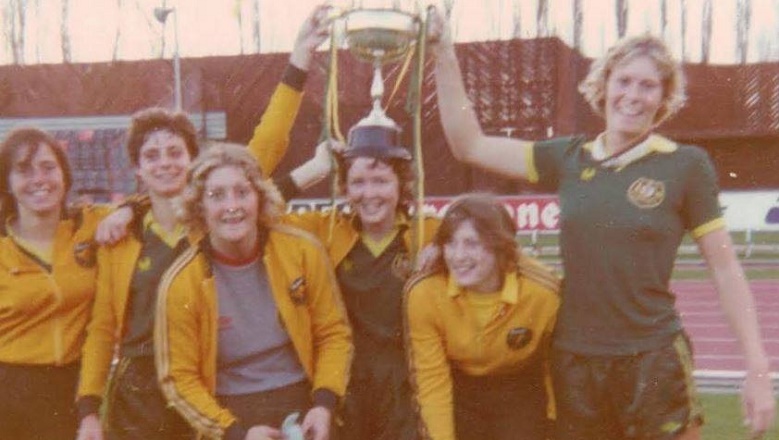More than 20,000 Australians filed into the Bankwest Stadium located in the Sydney suburb of Parramatta.
40 years earlier however, the story was a little different.
In October 1979, 11 Australian women walked onto a football pitch in the Sydney suburb of Miranda, greeted their New Zealand opponents, and took part in the first international ‘A’ match for the Matildas.
The match was attended by a few curious spectators who took their seats on the splintery wooden benches that surrounded the grounds.
The ninety minute match received next to no media coverage, with a small clipping making its way into the Canberra Times several weeks after the match had been played.
Throughout the 80s, the Matildas played a limited number of major international competitions, which relegated women’s football to the sidelines in terms of national attention.
Indeed, it wasn’t until the 90s – when women’s football became a permanent Olympic event and the FIFA Women’s World Cup was launched – that national interest in the sport really started to grow.
National interest in women’s football has also been buoyed by the impressive success of the Matildas throughout the years.
While the team failed to qualify for the inaugural FIFA Women’s World Cup in China in 1991, since that time they have never missed a beat – successfully qualifying for every subsequent World Cup.
Better yet, if the statistics are anything to go by, it is clear the Matildas have continued to evolve and improve throughout the years.
In the 1995 World Cup, the Matildas scored three goals, but had 13 goals scored against them - for an overall goal result of minus 10. In the 1999 Cup, the overall goal result had reduced to minus 4; while in 2003 the overall goal result was minus 2. At the 2007 Cup, Australia made it all the way to the quarter finals.
Since then, the team has improved even further and taken on some of the world’s greatest teams (and won).
During their 2019 FIFA World Cup appearance, Australia made it to the round of 16 before being eventually defeated by Norway. But while they didn’t make the quarter finals that year, Matildas’ star player, Sam Kerr, made history when she became the first Australian to score a FIFA World Cup hat-trick in a thrilling 4-1 victory against Jamaica.
Just as the Australian Matildas have improved at every FIFA World Cup showing, the team has gone from strength to strength each time they have appeared at the Olympics.
The Matildas qualified for the Olympics in 2000 (as the host nation) and again in 2004, after beating out Papa New Guinea and Fiji at the Oceania qualifying tournament.
Following the 2004 Olympics, the team failed to qualify again until 2016. At the Rio Olympics, the team managed to make the quarter finals where they were eventually beaten by a tough Brazilian team.
The team also successfully qualified for the 2020 Olympics, which was put on hold last year due to the global health pandemic.
When the Tokyo Olympics eventually commences in July this year, no doubt all eyes will be on the Matildas.
The success of the Matildas and the incredible athletic skills of the women who make up the team hasn’t been overlooked by Australia.
In recent years, the national female football team has become a much-loved and integral part of Australian sporting lexicon.
In fact, the 2019 BenchMark Emotional Connection study, conducted by True North Research, named the Matildas as Australia’s most-loved sporting team.
Following their FIFA Women’s World Cup 2019 campaign in France, the Matildas received an influx of celebrity and fan support across social media, an increase in viewership figures for their 2019 matches, and growth in 2023 bid supporter registrations.
In addition to gaining many more fans, it is fair to assume that the success of the Matildas has helped to increase female participation in the sport.
According to Football Australia’s 2019 National Participation Report, the number of females registered to play football grew 11 per cent between 2018 and 2019.
Today, females represent approximately 22 per cent of all football players across the country.
Looking ahead, the future seems bright for the Matildas. Led by the incredible Sam Kerr and supported by stars including Ellie Carpenter and Caitlin Foord, the Matildas certainly seem to be walking down the pathway to great international success.



